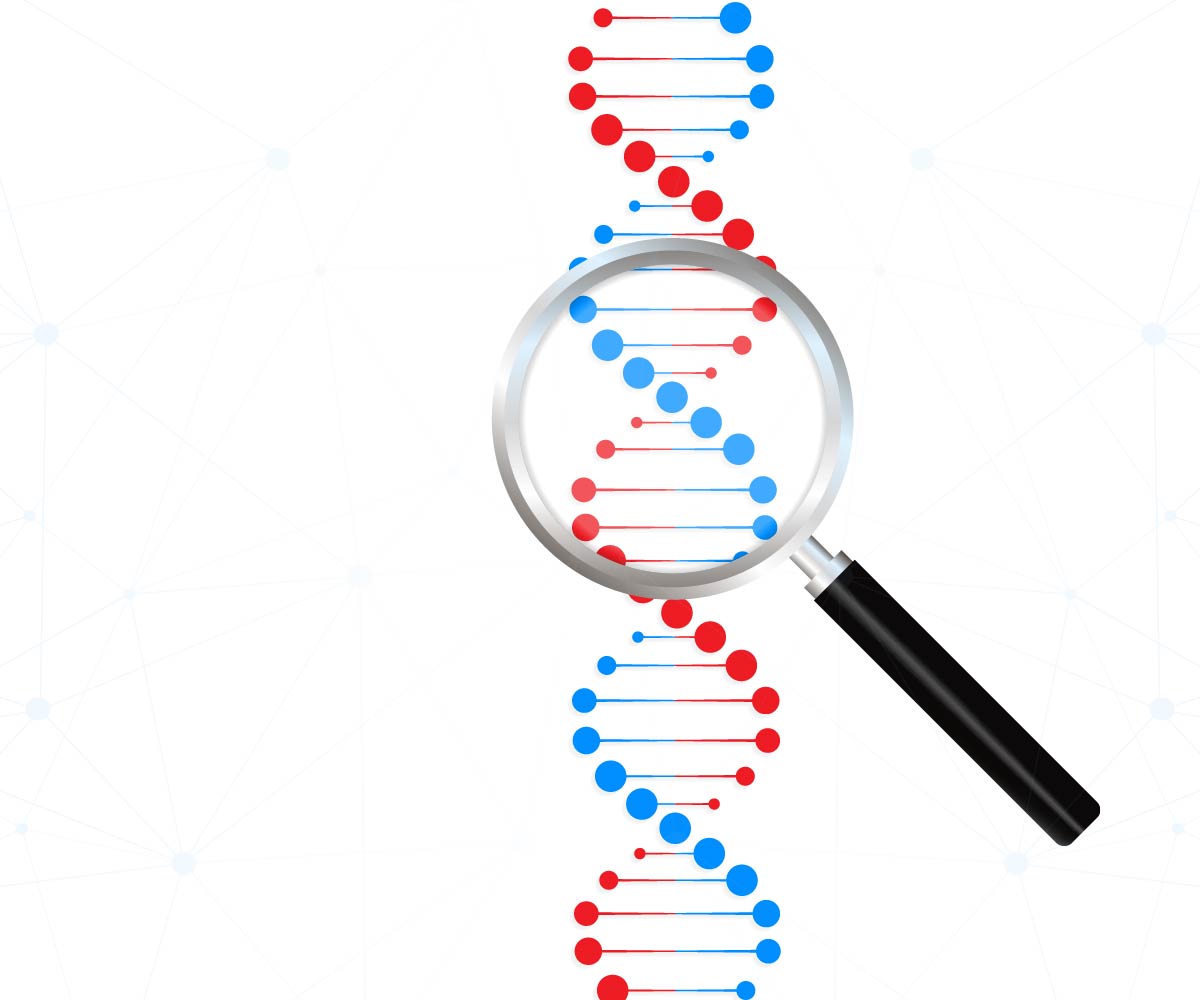Genes and Chromosomes
Our bodies are made up of millions of cells. Most of those cells contain a complete set of genes. Genes act like a set of instructions, controlling our growth and how our bodies work. They are also responsible for many of our characteristics, such as our eye colour, blood type or height. We have thousands of genes. We each inherit two copies of most genes, one copy from our mother and one copy from our father. That is why we often have similar characteristics to both of them.
Genes are located on small thread-like structures called chromosomes. Usually we have 46 chromosomes in most cells. One set of 23 chromosomes we inherit from our mother and one set of 23 chromosomes we inherit from our father. So we have two sets of 23 chromosomes, or 23 pairs.
Sometimes, there is a change (mutation) in one copy of a gene or chromosome which stops it from working properly. This change can cause a genetic condition because the gene is not communicating the correct instructions to the body. Some examples of genetic conditions include Down’s syndrome, cystic fibrosis and muscular dystrophy.

Genetic Testing

A genetic test can help identify if there is a change in a particular gene or chromosome. It is usually a blood or tissue test. There are a number of reasons why a person might take a genetic test. Some of the reasons are listed below:
- You or your partner have a child with learning difficulties, developmental delay or health problems. The doctor thinks it might be a genetic condition.
- Your doctor thinks you may have a genetic condition and wants to confirm the diagnosis.
- There is a genetic condition that happens in your family. You want to know if you are at high risk of developing the condition during your lifetime.
- You or your partner have a genetic condition that might be passed on to your children.
- You have had another type of test that is done during pregnancy (such as an ultrasound, nuchal translucency scan or blood test). It has shown that there is an increased risk that your baby has a genetic condition.
- You or your partner have had a miscarriage or stillbirth.
- Particular types of cancer have occurred in several close relatives.
- There is an increased risk of having a child with a particular genetic condition because of your ethnic background. Examples of this include sickle cell in people of Afro- Caribbean descent, beta -thalassaemia in people of Mediterranean descent, cystic fibrosis in people of Western European descent and Tay Sachs in people of Ashkenazi Jewish descent. These conditions are more prevalent in these particular ethnic groups, but may occur in others.
Benefits and Risks of Genetic Testing
The decision about whether to take a genetic test can be a difficult one. Taking a genetic test is your choice. Therefore it is important that you have discussed and understood all the information that you have been given to help you make your own decision. It is also important that you have the opportunity to discuss with the doctor any questions or worries that you may have.
Genetic testing can bring great benefits, but there are also a number of possible risks and limitations. It is important to understand the benefits and risks before making a decision. Some of these benefits and risks are discussed below. The list is not complete, and not all the points will be relevant to your specific situation. They might however give you some useful things to think about and discuss with the doctor or health professional.
Benefits
A genetic test might be able to tell you for certain about you or your child’s genetic makeup. For some people this relief from uncertainty is very important, even if the news is bad. If the news is good, it can mean a tremendous sense of relief.
A genetic test can help diagnose a genetic condition. When someone has an accurate diagnosis, the appropriate treatment can be given. If a genetic test tells you that you have an increased risk of developing a condition later in life (such as breast cancer) you might be able to go for more regular check-ups, and so keep the risk to a minimum.
The results of a genetic test can provide useful information when planning for future children. If you know you and your partner are at high risk of having a child with a genetic condition, it may be possible to test the unborn child during pregnancy to see if it is affected. Knowing you have an increased risk of having a child with a genetic condition might give you the opportunity to be more mentally and practically prepared.
Because genetic conditions often run in families, information about your genetic makeup might be useful to other family members. If family members are aware that a genetic condition runs in the family, it might prevent them from being misdiagnosed. This information might also be of use to them when they are planning children.
Predictive genetic testing is the use of a genetic test in an asymptomatic person to predict future risk of disease. These tests represent a new and growing class of medical tests, differing in fundamental ways from conventional medical diagnostic tests.
Possible risks and limitations
Taking a genetic test, waiting for the results, and then receiving them may cause a range of mixed emotions such as relief, fear, anxiety or guilt. It is important to think through the possible consequences for you and your family if you were to receive either good news or bad news.
Even though a genetic test may confirm a diagnosis, there may be no intervention or treatment available. In some people a gene or chromosome change (mutation) cannot be found. This does not necessarily mean there is no change. Some genetic mutations are very difficult to find with current laboratory techniques. For those trying to get a diagnosis this can be very frustrating. You should discuss this issue with your doctor.
For some conditions, even though a changed gene or chromosome is found, it is not possible to tell how severely a person will be affected.
Genetic mutations are often passed down through families. Therefore, the results of your genetic test may reveal genetic information about other family members, in particular their genetic risk of a condition . Will other family members want to know this?
It might be important to find out how the results of a genetic test would affect your insurance and employment situation before going ahead with testing.
Test results may sometimes reveal family secrets involving paternity and adoption.
Once you have the results of a genetic test there is no going back. If you are considering a genetic test it might also be useful to have a look at the Frequently Asked Questions leaflet. The leaflet lists a number of questions that you may want to ask the health professional about genetic testing . It has been developed with the help of patients and families who have been through a similar experience to your own

